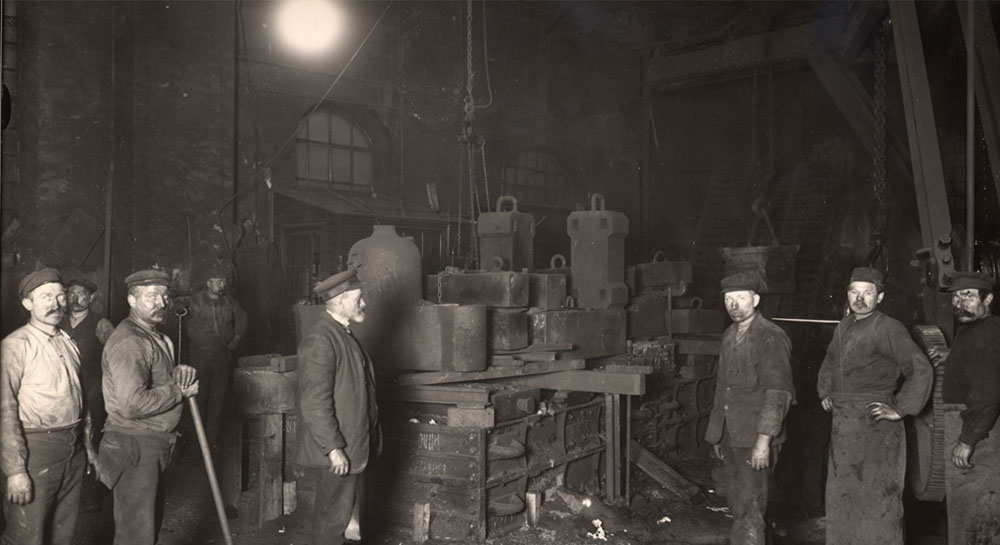
The spirit of the age: 1853–1888
In the middle of the 19th century, the industrialization of Sweden took off. Chimneys with thick smoke, mechanical workshops and steam sawmills became common sights in the cities. Railways were constructed to transport goods and new towns were built along the tracks. A society based on consumption started to take shape.
Politically, it was a turbulent time with dramatic changes implemented in a short period of time. Following reforms in 1862, cities with more than 3,000 inhabitants set up city councils, making local administration both cheaper and more efficient. In the past, representatives of traditional industries such as fishing and handicrafts had great influence in society. The power now shifted gradually to a new generation of wholesalers, merchants and industrial magnates.
Voting rights were granted based on income and wealth: Depending on their annual income or personal wealth, some people had to pay tax. Those who paid tax also had the right to vote. The richer you were, the more votes you got. The system was unfair, but it was still the first step towards a modern democracy. An increasing number of people were included in the political system. Some men broke out of their class and became so-called ”self-made men”, a description that fits L.O. Smith very well. Smith made the most from the development. In his home town of Karlshamn, he participated actively in local politics on behalf of liberally minded people. He was also an active member of Sweden’s new two chamber parliament.
Sweden’s traditional parliament goes back to the 15th century. Known as the “Riksdag of the Estates”, it consisted of representatives from the nobility, clergy, burghers and peasants. In 1865-1866, the system was abolished to give way for the two-chambered parliament, which meant that entrepreneurs, doctors and teachers had an opportunity to take part in and influence the political development.
Other historical decisions paved the way for a more dynamic business life in Sweden. First of all, the business freedom reform came into force under finance minister Johan August Gripenstedt. In 1864, the Trade and Industry Regulation was introduced, which abolished Sweden’s traditional guild system, even in the cities. From then on, anyone could work as an artisan, without having an official certificate as a master or an apprentice. It was also possible to set up trade or open a factory in rural areas. Some exceptions and limitations remained, for example for married women, but the reform was nevertheless a milestone.
Gripenstedt supported several initiatives to promote the business sector. He was responsible for including Sweden in the Free Trade Treaty in 1865 and various other decisions within banking. When Sweden’s modern banking system emerged, André Oscar Wallenberg became one of the key players. In 1864, a new bank law made it possible to set up permanent commercial banks. Up until then, permits had only been granted for limited periods.
Gripenstedt was also involved in the government’s railway policy, which was one of the main political issues in the second half of the 19th century. Railway constructions were crucial for the new industrial society, and the Swedish state raised large bond loans abroad to invest in the main railway lines. Other infrastructure investments were also done. Telegrafverket, the state-owned telecommunications company, set up their first electric telegraph between Stockholm and Uppsala in 1853, and the post introduced stamps in 1853-1854.
Sweden developed into a country that was quick to adopt and develop new innovations. When telecommunications were introduced in 1880, Stockholm soon become one of the most telephone-based capitals in the world. The municipal of Härnösand, on the east coast of Sweden, built Europe’s first electric street lights in 1885.
Political reforms, new technology and population growth paved the way for Sweden’s industrial breakthrough in the 1870s. Some of the most important industries were northern Sweden’s sawmill industry, the engineering industry and the steel and iron industry. The importance of the consumer goods industry has over been underestimated, however. Breweries, liquor production and the sugar mills centralized and industrialized their production at an early stage. They were later followed by mills, bakeries, dairies and other food manufacturers. L.O. Smith devoted his life to entrepreneurship in several of these pioneering industries.
How come the Swedish liquor industry was characterized by large corporations from the start? The answer can be found in politics, for example in the 1855 ban on private spirit production, and the introduction of the dominating non-profit companies in the cities. The liberal ideas with simpler rules and increased free trade were beneficial to Smith, and he worked hard to actively influence the political development in his desired direction.